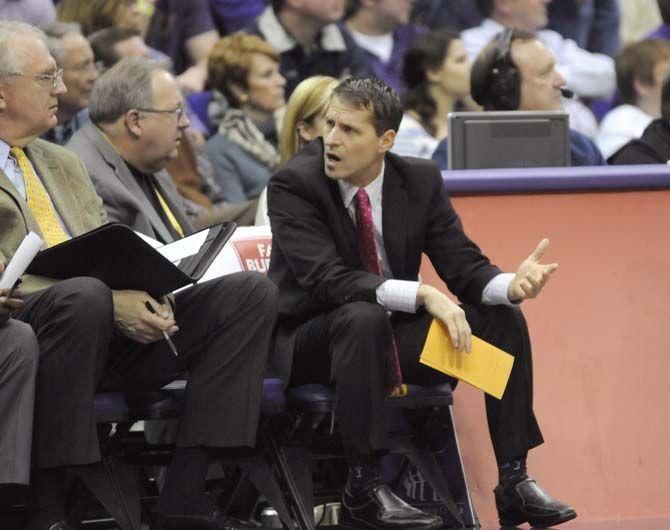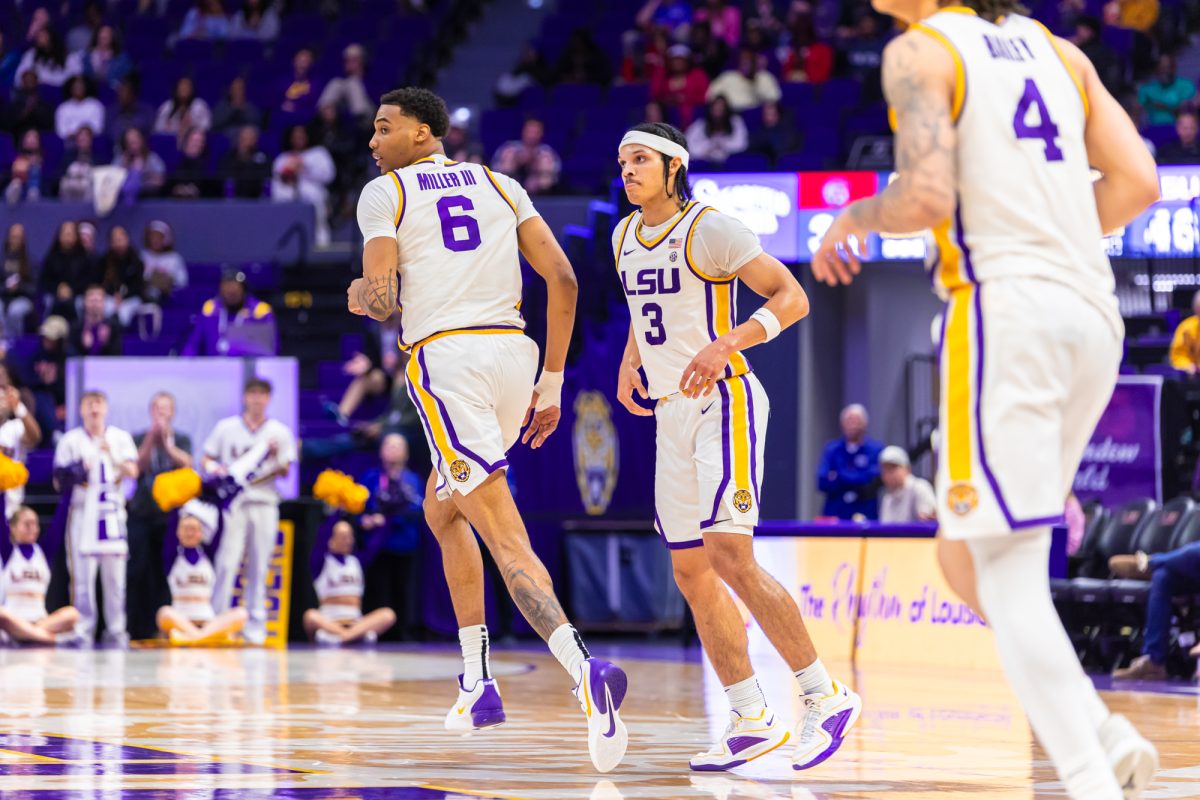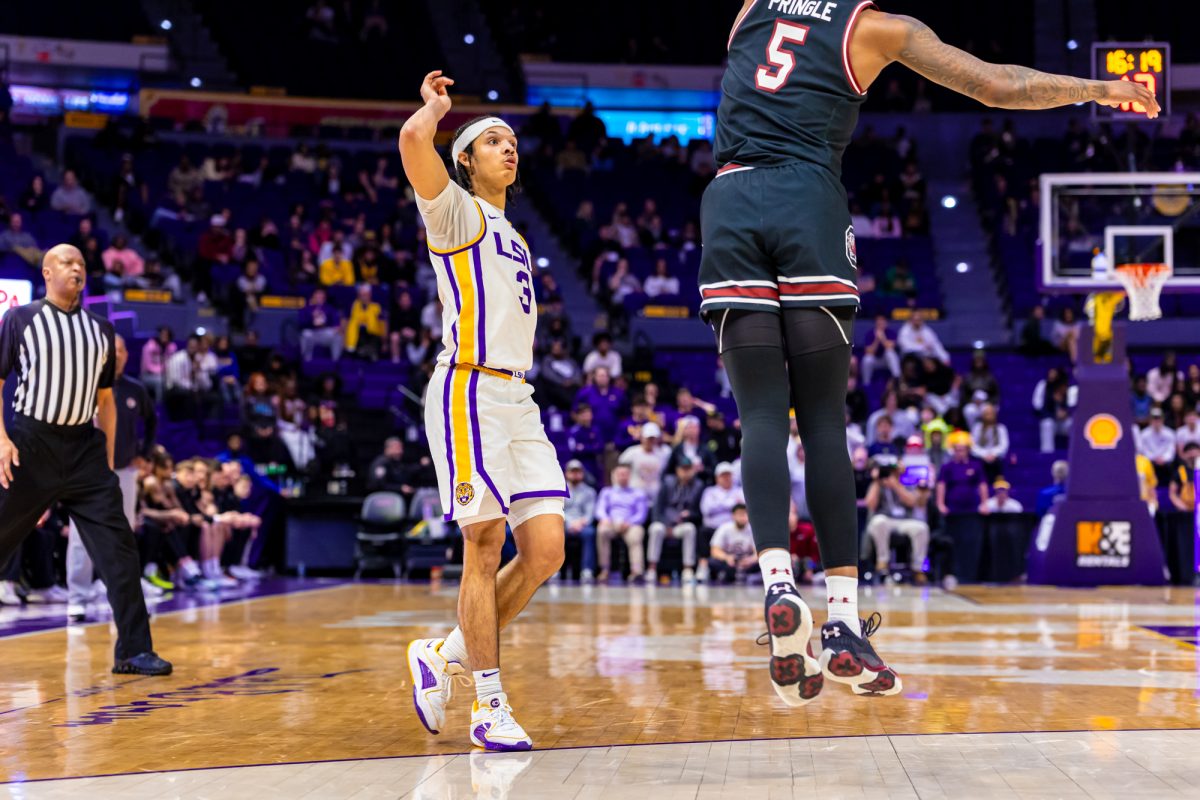LSU men’s basketball associate coach Eric Musselman lives by the three “Es”: energy, effort and enthusiasm — a motto frequently echoed by his late father, Bill.
Much like his father, a fourth “E” could be used to define Eric — experienced.
The journeyman coach has made a home for his family in Baton Rouge serving under coach Johnny Jones, but coaching college basketball has been only a recent trend for Musselman.
“He has some stories,” said junior guard Keith Hornsby.
Before a two-year stint at Arizona State under Herb Sendek, Musselman spent 23 years in the professionals ranks. He spent two seasons as a head coach for the Golden State Warriors and one season as a head coach for the Sacramento Kings, but his basketball roots start with his father, a former American Basketball Association and NBA coach.
The Ashland, Ohio native’s memories of basketball start at 5 years old, when his family lived in Minneapolis, Minnesota. Musselman spent breakfast watching game film of his father’s University of Minnesota squad on television and afternoons at the Golden Gophers’ practices.
“At a young age, my dad was a high-energy guy,” Musselman said. “That’s the household I grew up in, to be extremely competitive and have a fierce will to win. Every day you wake up, come with high energy and be enthusiastic. … When you’re inbred with that mentality and you’re brainwashed with it every single day hearing it, that’s what you become.”
Musselman acknowledged that he peaked in size and skill as a player at the University of San Diego, which forced him to focus on the fundamentals of the game. He had an opportunity to play basketball beyond college — he was drafted in the Continental Basketball Association in 1987 — but decided to follow in his father’s footsteps.
“I played for two great, great college coaches in [former San Diego coaches] Jim Brovelli and Hank Egan,” Musselman said. “Both are phenomenal coaches. I got a chance to participate in two NCAA Tournaments as a freshman and a senior. From there, even with the [draft pick in the Continental Basketball Association], I knew that I was going to go straight to coaching.”
Musselman made his real mark with player development during several seasons in the Continental Basketball Association, United States Basketball League and the NBA Developmental League. Musselman headed talented D-League teams that featured current NBA standouts Jeremy Lin, Danny Green and Gerald Green.
His tenure in the D-League served as a comfortable bridge to coaching college basketball, especially at LSU, where Jones teaches similar habits.
“Coach Jones is so big on the fundamentals of the game, and I’ve been so impressed with what we do in practice because we do catching, passing, pivot and footwork drills,” Musselman said. “He breaks the game down to its simplest form, which is the greatest gift to try to help guys develop and become better.”
“His demeanor in trying to build people up instead of tearing people down is why players enjoy coming to the gym, and the assistant coaches enjoy coming to work.”
Musselman’s philosophy, though, started with his father, whom he considers “one of the greatest defensive coaches in the history of college basketball.”
He refined his skills under the tutelage of coaching greats Chuck Daly, Hubie Brown and Doc Rivers, along with working with current Chicago Bulls coach Tom Thibodeau.
“[Musselman has] taught us some valuable stuff,” Hornsby said. “His ability to speak up and really deliver straight-to-the-point corrections to what we do. He doesn’t beat around the bush. He tells us what it is.”
Although his tenure as an NBA head coach was brief, his philosophy led to success.
Musselman was named runner-up to San Antonio Spurs coach Gregg Popovich for Coach of the Year in his 2002-03 season with the Warriors.
“It’s not always about some secret formula,” Musselman said. “It’s about building guys’ confidence up, making them feel good about themselves and making them feel good about putting in extra time pre-practice and post-practice.”
Through his experiences, Musselman understands player improvement doesn’t happen overnight, especially with this year’s youthful Tiger team. He said it requires forming solid relationships with the individuals, something LSU assistants David Patrick and Charlie Leonard have accomplished.
“I think his résumé speaks volumes for his knowledge of what he’s capable of doing,” Jones said. “The great thing I like about him is his willingness coming in and being able to share with and experience the relationship he has built with the other assistant coaches in the manner he’s really gone about it.”
Musselman, though, never stops learning new ways to approach his job. As an avid reader, Musselman blogged during a three-year coaching hiatus after his term with the Kings, and he now uses Twitter as a method to share quotes and ideas from coaches and players he respects.
“I tweet out philosophical things that I feel like coaches would want to read, leaders of companies would want to read, quotes I want my sons to read and quotes that high school players would want to read,” Musselman said. “The best thing about it is I continue to make new contacts through doing that.”
You can reach James Bewers on Twitter @JamesBewers_TDR.






